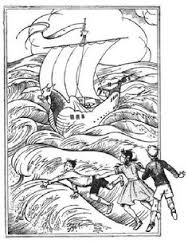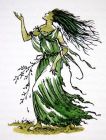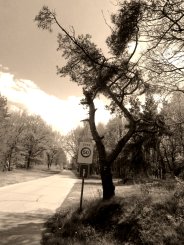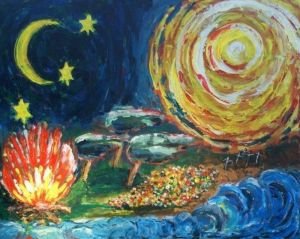“In our world,” said Eustace, “a star is a huge ball of flaming gas.”
“Even in your world, my son, that is not what a star is but only what it is made of.” – C.S. Lewis -the voyage of the Dawn Treader
 Recently I encountered an article on Facebook from ‘the week’, a to me unknown publication, which argued that Paganism might be making a comeback in the US. Now while a compelling case could be made for this idea, I must say that with this specific article even my Pagan FB friends didn’t seem to take the article very seriously. I could also remark that the word ‘come-back’ is a bit weird since ancient European or Mid-Eastern Paganism has never been present on North-American soil as a majority religion. Not even in the pre-Columbian Viking settlement, since Leif Erikson was actually an Orthodox Christian, but that’s besides the point
Recently I encountered an article on Facebook from ‘the week’, a to me unknown publication, which argued that Paganism might be making a comeback in the US. Now while a compelling case could be made for this idea, I must say that with this specific article even my Pagan FB friends didn’t seem to take the article very seriously. I could also remark that the word ‘come-back’ is a bit weird since ancient European or Mid-Eastern Paganism has never been present on North-American soil as a majority religion. Not even in the pre-Columbian Viking settlement, since Leif Erikson was actually an Orthodox Christian, but that’s besides the point
Although no-one seemed to have been particularly impressed by the article in the the interesting and quite respectful Facebook conversation it created on my wall, and I’m not going into all the issues here (write your own blogpost about Paganism and scapegoating if you feel inclined to do so, I will surely read it and probably even share it!), there was one thing that caught my eyes because I’ve been meaning to write about for a while now. And that ‘thing’ is the first difference given in the text between a ‘Christian’ worldview and a Pagan one: in Paganism, according to the text, we have a ‘world full of agencies’, as they call it:
“As seen in the ancient Greek, Celtic, and Norse traditions, the pagan idea most alien to the modern worldview is probably the belief that the entire cosmos is animated by agencies.”
I must confess that the word ‘agencies’ sounded for a second like they were talking about dull bureaucratic entities, but since those are never very animating in any sense of the world that can’t be what they meant. What they do mean something like a world animated with spirits, or a world full of persons, some of which are humans. In other words, basically they’re talking about an Animist worldview.
And here comes my main point: while some people might not like the idea of an Animist worldview (some of which are connected to Modernism, others probably to fear of the unknown), this is not at all something that needs to be opposed to Christianity. But indeed i’s rather something antithetical to modernism and its philosophical forefathers, and thus also partly to the forms of Christianity that either helped forming modernity or in a secondary move also those that have been shaped by it.
It probably star ted with Erasmus or even Scotus and was very prevalent in the Renaissance tendency to get rid of everything viewed as ‘superstition’. And so in Christian modernism (which includes a lot of protestant traditions) we find a fear and adversity to any even remotely animist idea. A commenter on the first post of the series on ‘faerie’ on Dr. Richard Becks experimental theology blog gives us a nice example of this resistance to ascribing any animist dimension to this Reality we live in:
ted with Erasmus or even Scotus and was very prevalent in the Renaissance tendency to get rid of everything viewed as ‘superstition’. And so in Christian modernism (which includes a lot of protestant traditions) we find a fear and adversity to any even remotely animist idea. A commenter on the first post of the series on ‘faerie’ on Dr. Richard Becks experimental theology blog gives us a nice example of this resistance to ascribing any animist dimension to this Reality we live in:
When we re-enchant the World, what are we doing? Part of the Reformation’s emphasis was to strip the world of fantasy, not of spiritual. Peasants no longer had to fear that an irate saint of the local bridge would drown them if they did not drop a florin in the toll-box. Of course, the agents of the so-called Enlightenment took the critique without their source. There were no such things as spirits, devils, angels, gods etc. nothing that man’s “ever-watchful eye” could not prove.
(Note that the guy is going way too far for a pure reformation or actually any small ‘o orthodox Christian’ worldview. Luther himself would be quite shocked to hear that there are no devils for example…)
The main fear here, apart from a modernist control issue and a humanist ‘man conquers nature’ ideology, is probably that of idolatry: that the ‘agencies’ if we acknowledge them will become too important, and that they might take the place God only deserves. This is a valid concern, and people who do acknowledge those realities do sometimes fall into this trap indeed. But an argument out of fear of consequences is never a good way to accept the reality of something.
I will also add here that strangely enough the same concerns are never uttered towards human power, systems, and Winkian Powers like Mammon, while those are recognised and their claims to legitimacy are sometimes uncontested. No matter if they are seen as personal or not, their influence stays the same, and keeps us from God and from seeking first the kingdom and Hid righteousness all the same…
So it might go completely against the grain of a lot of modernist Christianity, bu t it certainly is my intuition that recognising this ‘Animist dimension’ of the created world is not really a heterodox oddity of some ‘progressive’ green modern thinker, lost in basckwards synchretism and making up stuff that has no basis in either the bible or Christian tradition or something else fringe and new. I’d rather say that it is just a part of Christianity, even though it might be hidden for eyes that cannot see it. It is very clearly present in the bible, and moreover has been often voiced by the Christian tradition.
t it certainly is my intuition that recognising this ‘Animist dimension’ of the created world is not really a heterodox oddity of some ‘progressive’ green modern thinker, lost in basckwards synchretism and making up stuff that has no basis in either the bible or Christian tradition or something else fringe and new. I’d rather say that it is just a part of Christianity, even though it might be hidden for eyes that cannot see it. It is very clearly present in the bible, and moreover has been often voiced by the Christian tradition.
And I’m not only thinking about angels in heavely realms here… (I do believe that Charismatic Christianity and Pentecostalism were among other things part of a movement of the Spirit to bring this and other spiritual dimensions back into modernist Christianity, lest it be rendered completely impotent as a dead muggle religion, that often has been moved only in the private space altogether.)
As one of my Facebook-commenters said: “I might be simple-minded, but, how could you read the Psalms and not be basically OK with animism?”. There are lots of verses in the psalms that seem to ascribe agency and the capacity of worshipping God to animals, trees and the elements of nature. When I was a kid one of my favourite songs was about trees that clap their hands for God.
We do take this as pure metaphor as moderns. I don’t know if that’s the best way of viewing it though. There is a rather animist worldview in the background of most of the bible that we just dismiss as moderns. The problem for Christianity is not that the world isn’t full of living beings, but that the are not to be seen or treated as divine in themselves. This is the danger of animism.
 But I would say that it’s quite clear most moderns outside of the New Age and Neo-Pagan niche are not at all in danger of divinizing nature, thus and giving so much respect to creation that it diminishes our respect for the Creator. Au contraire mes amis, most of us can need a healthy dose of realisation that Nature is Alive. That we humans are not everything. And also that God Himself is Present and Neo-Paganism (as well as New Age, but also the rise of Charismatic Christianity on the other side) is indeed an answer to this reductionist modernist desacralisation and disenchantment. Smashing the mystery out of Christianity (something that goes back at least to the reformation), is a good way to sterilise religion and in the end kill it from within. Too much Bultmann-manouvres and Christianity dissolves completely…
But I would say that it’s quite clear most moderns outside of the New Age and Neo-Pagan niche are not at all in danger of divinizing nature, thus and giving so much respect to creation that it diminishes our respect for the Creator. Au contraire mes amis, most of us can need a healthy dose of realisation that Nature is Alive. That we humans are not everything. And also that God Himself is Present and Neo-Paganism (as well as New Age, but also the rise of Charismatic Christianity on the other side) is indeed an answer to this reductionist modernist desacralisation and disenchantment. Smashing the mystery out of Christianity (something that goes back at least to the reformation), is a good way to sterilise religion and in the end kill it from within. Too much Bultmann-manouvres and Christianity dissolves completely…
I’m not saying anything new here. The pre-modern church has always believed in intelligent non-human agents in the cosmos and in nature. Even the Pope seems to agree with that, which can be read through the lines in his ecological encyclical Laudaro Si (read it here Did you ever think of a time when we would read Papal encyclicals on the internet?). The title alone is a strong reference to the Animist dimension, as it is a quote from Saint Francis’ canticle of the sun.
The canticle (just as psalm 148 for example) is a perfect place to see how the Animist dimension is fitted into a Christian worldview. The elements and the creatures (yes, even death) are seen as persons, fellow creatures that all are made by the same Creator, and that all worship the same Creator. And while it starts very certainly with an affirmation of a very Monotheist God-centered Christianity, all the other things are fitted neatly in there too. So let’s meditate on this text and psalm 148 for a while to close our thinking about the Animist dimension of Christianity… (This translation comes from wikipedia. )
Most high, all powerful, all good Lord!
All praise is Yours, all glory, all honor, and all blessing.
To You, alone, Most High, do they belong.
No mortal lips are worthy to pronounce Your name.Be praised, my Lord, through all Your creatures,
especially through my lord Brother Sun,
who brings the day; and You give light through him.
And he is beautiful and radiant in all his splendor!
Of You, Most High, he bears the likeness.Be praised, my Lord, through Sister Moon and the stars;
in the heavens You have made them bright, precious and beautiful.
Be praised, my Lord, through Brothers Wind and Air,
and clouds and storms, and all the weather,
through which You give Your creatures sustenance.Be praised, my Lord, through Sister Water;
she is very useful, and humble, and precious, and pure.
Be praised, my Lord, through Brother Fire,
through whom You brighten the night.
He is beautiful and cheerful, and powerful and strong.Be praised, my Lord, through our sister Mother Earth, who feeds us and rules us,
and produces various fruits with colored flowers and herbs.Be praised, my Lord, through those who forgive for love of You;
through those who endure sickness and trial.
Happy those who endure in peace,
for by You, Most High, they will be crowned.Be praised, my Lord, through our sister Bodily Death,
from whose embrace no living person can escape.
Woe to those who die in mortal sin!
Happy those she finds doing Your most holy will.
The second death can do no harm to them.
Praise and bless my Lord, and give thanks,
and serve Him with great humility.
Amen
So what do you think?
peace
Bram

I’m really glad to see you raising this, Bram. My own background is biology degree and Christian faith. I have increasingly been thinking ‘what ifs’ very much like you describe….what if the people who wrote those lines in the psalms, not to mention St Francis, meant what they said in a far more tangible way that the watered down metaphors they have come to be accepted as? Increasingly the New Scientist (UK magazine) is having articles exploring topics such as consciousness, and I recall reading articles speculating on what a plant or rock consciousness would ‘look like’, given that they are so so so different from us they are likely to be conscious in a very different way also!
It’s probably related to theories of ‘pan-consciousness’ too even. I didn’t know that those ideas had already reached publications as ‘New Scinetist’, that’s interesting. I’m just patching the bible and older Christian traditions together (from an open but ‘small o orthodox POV) with older or more close to nature worldviews here. which makes me a bigger literalist than the fundamentalists on this issue. Well, I already had that with ‘love your enemies’ for example…
I think we must let go of our enlightenment (and reformation) anthropocentrism that sees humans as the only rational beings though.
Pingback: Christianity: first a question of allegiance, not worldview! | Brambonius' blog in english
Pingback: Review: Bob Doto – Sitting with Spirits | Brambonius' blog in english